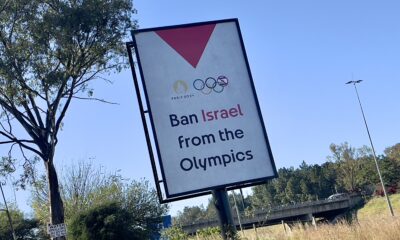
Banner

Regulator delivers technical knockout to anti-Israel advertisers
Anti-Israel sentiments on billboards alongside Gauteng’s roads have abounded since the Hamas terror attack of 7 October, but now the public has recourse against anonymous adverts of this nature.
A new ruling by the Advertising Regulatory Board (ARB) instructs its members not to erect outdoor advertising calling for Israel to be banned from the Olympics – never mind that the Paris Games are long over – where the advertiser isn’t identified on the billboard itself.
Though the decision doesn’t judge the substance of these “political” messages, it does prevent such no-name advertisements from being installed or carried. These billboards are part of a broader campaign to ban Israel from international sport, a tactic well employed against apartheid South Africa.
A complaint against the Olympic-ban billboards was lodged with the ARB by a member of the public. This outed the advertiser as the notorious anti-Israel lobby group Africa4 Palestine. The complainant said the billboard “calls for the ban on a sovereign country because they are mainly Jewish and they are fighting back in a war thrust upon them. It’s hate speech, it incites violence, and is despicable.”
The ARB approached Africa4Palestine for a response, to no avail.
Gail Schimmel, the chief executive of the ARB, told the SA Jewish Report, “We are the industry self-regulatory body for the content of advertising. A billboard expressing an opinion on an issue isn’t really advertising in the true sense. The ability for people to communicate their views is a function of freedom of speech, providing it doesn’t become hate speech.
“This said, our code is specific about this type of material. While we don’t deal with controversial opinions, it requires the identification of exactly who it is that placed the material. It was this aspect that we ruled on. Whether or not it was hate speech is a complaint for the South African Human Rights Commission (SAHRC), not the ARB. Since October last year, we have received a number of complaints about material relating to the situation in Gaza from both sides, and in all cases, we have referred the complainants to the SAHRC.”
“The important take out,” Schimmel said, “is that if you see material of this nature, the ARB can help if you just want to identify who placed the material. The SAHRC is the correct body if you believe the content goes beyond an opinion and amounts to hate speech.”
The ARB said that in the spirit of free and fair speech, its Code of Advertising Practice “seeks to limit the [ARB] directorate’s considerations to claims capable of objective interpretation, without getting dragged into controversial and emotive social discourse. In controversial matters, there’s unlikely to be an objective single truth, which is why the ARB code expressly precludes the directorate from weighing in on such matters, as doing so would run contrary to the intention and purpose of the ARB.
“There can be no dispute that the protracted war between Israel and Palestine is a controversial and emotive issue. It’s therefore not surprising that people hold strong opinions over who they perceive to be the aggressor and who they perceive to be retaliating, or what they believe would end the bloodshed. This means that the directorate isn’t empowered to express a view on this matter insofar as the content and likely interpretation of, or impact on, reasonable viewers would be.”
The South African Constitution protects free speech, but the ARB said knowing the identity of the advertiser “allows any person who holds strong views to reach out and make contact with the advertiser, should they choose to do so”. Not displaying these details “robs consumers of the opportunity to engage with the advertising and/or advertiser in any meaningful manner”.
Even though the 2024 Olympics are long over, the ARB instructed its members “not to accept the advertisement … without clear identification of the advertiser, or clear and current contact information.” There will be other Olympic Games, and this campaign is likely to continue. The focus now is shifting to ban Israel from international football.
Said Israeli journalist Rolene Marks, “Once again, Africa4Palestine is looking to sow division and import a conflict into South Africa by any means necessary. Sport has always been a great unifier and bridge-builder between people. Africa4Palestine seeks only to break down any potential discourse or peace or bringing together of communities, especially at a time when children – Muslim and Jewish, Israeli and Palestinian – deserve a better future than the current politics of blame and intimidation.
“It’s typically cowardly behaviour of Africa4Palestine to intimidate and threaten and then hide behind anonymity – a tactic often displayed by the Boycott, Divestment, Sanctions coalition and its supporters,” Marks said.
Frans Cronje, an independent analyst, strongly disagreed. The issue should be whether a message complies with the laws of the country or not, he said. “In this case, the message that Israel be banned from Olympic competition surely does comply. Discouraging its placement on account of the advertiser not being identified seems like a censorship device to keep the message from being broadcast. This is a freedom-of-speech issue. If some find the billboard offensive, that’s tough. Many people find Israel offensive. The pro-Israel lobby in South Africa loses because its strategies are inferior to those of its opponents. It cannot make up for that by banning the other side.”
Independent marketing consultant Heidi Brauer said, “Advertisers have a duty and responsibility to be clear and honest about who they are. This is so that the consumer can read their messaging in that context, and make informed decisions about how to process the information they contain. In fact, in financial services, there are strict rules about such clarity and disclosure, resulting in sanctions and fines for offending advertisers.
“Outdoor advertising used ‘anonymously’ could be both a way to show a body’s support base – that it’s sufficiently bold about a position to make it so loudly – and could also be a way to intimidate those in the opposition. Not revealing the identity of the advertiser dilutes the impact of the message for both sets of recipients. It causes assumptions to be made, and can add to distrust in an already intensely flammable environment.”
While the ARB’s ruling may seem technical, remember that mafia kingpin Al Capone was eventually nailed and jailed for tax evasion rather than his many mobster crimes.










